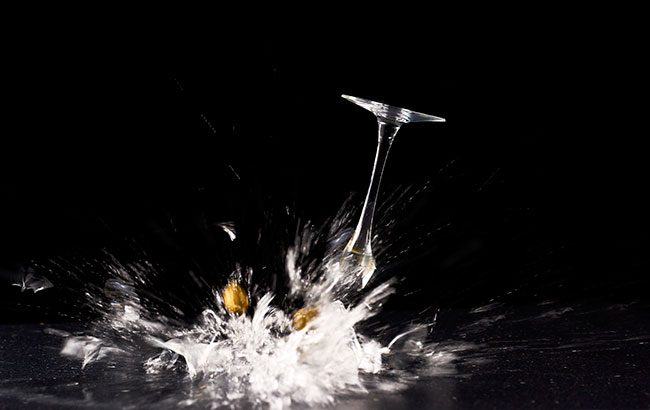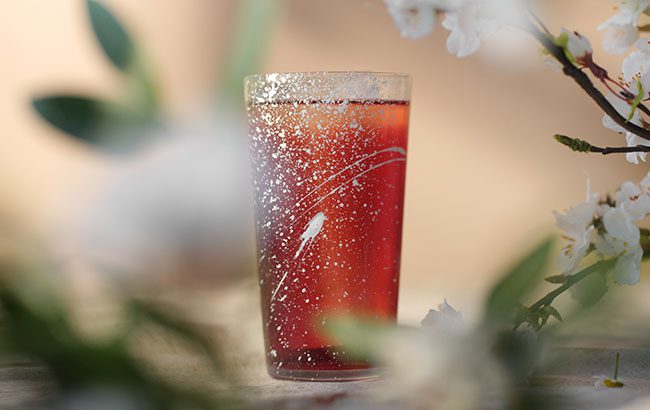When glassware is non-recyclable, what do bars do?
By Lauren BowesThe cost of broken glassware can be high for bars and recycling can be tricky, but many use ingenious solutions to get around the difficulties.

*This feature was originally published in the July 2025 issue of The Spirits Business magazine.
Glass is often hailed as the poster child of sustainable packaging. But for the bar world, which gets through the material at an alarming rate, the reality is more complicated. In the UK alone, an estimated 200,000 tonnes of glass from hospitality venues end up in landfill each year, according to waste-management company Business Waste.
Recycling is the obvious solution, and one that most businesses are on board with. But not all – as Scott DeFife, president of the Glass Packaging Institute, tells us. “In the US, there’s far less regulation around commercial recycling than residential, so many bars simply don’t recycle because no one’s making them [do so],” he says. “Plus, most commercial waste is commingled, which makes it harder to extract usable glass.”
The issues with single-stream recycling are also what prompted US mixologist Lauren Pellecchia to seek out alternatives. “Even though we think we’re doing a good thing, once the glass is in the single-stream programme, only 40% gets recycled – which is abysmal,” she explains.
The other issue is that most recycling programmes are equipped to deal with glass bottles, not glassware. DeFife explains that while bottles are made from soda-lime glass – a combination of silica sand, limestone, and soda ash – stemware and bar glasses are often made from other materials like borosilicate or crystal, which melt at different temperatures, or contain additives that can ruin a recycling batch.
“Not all barware is the same, and the big problem is that, unlike bottles, glassware rarely has any kind of markings that tell us what it’s made of,” says DeFife. “That makes it extremely difficult to accept in recycling programmes.”
Some manufacturers are already taking steps. Leading glassware company Riedel confirms that its full range is recyclable in regular domestic or commercial glass channels. Managing director Stephen McGraw adds that while some crystal glass on the market isn’t recyclable, Riedel’s has been since 2015. The company also recycles off-cuts and substandard glasses back into its own furnaces.
Could crushing over recycling be the solution?
Still, Riedel isn’t behind every bar. But Pellecchia has an alternative solution to recycling: crushing. Her GLS2.0 bottle crusher pulverises bottles and broken glassware into sand in three seconds. “It’s so cool,” she gushes. “The footprint for this model is small, so ours has a permanent home in an unused corner of the bar. It’s a great conversation piece.” It’s as simple as dropping bottles into the chute and collecting the sand when it’s done. The machine is too loud to be used during service, so the team at Merchants Club, in Newport, Kentucky, mass-crush on Mondays, when the bar is closed. Some of the bar’s neighbours have also joined in.
As for the sand created, Pellecchia says it can be used for “so many things. We make it available for employees and guests, who take it home for their gardens,” she explains. Local farms use it to improve drainage, and it’s useful for construction, landscaping, and road treatment. Some artist friends have also used it. “The artwork is gorgeous, and I’m proud to be a small part of what they create.”
Storage isn’t an issue either, with Pellecchia explaining that the bar has its sand stocks wiped out regularly. This spring, a river-conservation group reached out, hoping to re-establish flood-damaged riverbanks using the bar’s sand – but there wasn’t enough.

Starting small
Those interested can find small crushers for around US$900 on Amazon. “The glass is not crushed as finely, but it’s great for home or small-bar use,” she says. The GLS2.0 retails for between US$7,000 and US$8,000. “It is a major investment, but it’s an investment into our future, three seconds at a time,” she explains. “Where I live, recycling for a business is US$75 per pickup, plus weight-based fuel surcharges – this adds up quickly.”
Recycling and crushing both reduce waste – but the most energy-efficient option is not throwing away glass at all. That’s the principle behind the glass-repair programme at the American Bar in Gleneagles.
“We started off quite slow and steady – doing it all by hand with sandpaper,” says assistant bar manager Andrea Gardiner, who oversees the project. But as more chipped glasses appeared, the team invested in a sander to scale up. The team focuses on minor chips. “We don’t repair every glass – glasses with cracks aren’t safe for guests,” she explains. As well as safety concerns, there’s also Gleneagles’ reputation to uphold. “We want to ensure that guests are getting the five-star experience they’re expecting. It’s really important to us that we create something beautiful, elegant and refined.”
Sanding out chips can result in thinner or shorter glassware, making it unsuitable for service. These can then be donated or sold to staff. When the bar changes its menu and glassware, the old range can be sold in the resort’s shop.
It’s a time-intensive process: originally, one glass could take up to four hours. But with practice, the team has become more efficient. “Now I dedicate one or two days a month, more if we’ve had a high breakage rate. The team is involved too – it’s a real group effort,” says Gardiner.
Not every glass can be saved – especially those that shatter completely. “I wish we had a magic wand so we could put them back together,” she laughs. But to mitigate the environmental impact, the team began logging breakages to spot patterns. One issue was their powerful glass washer snapping stemware, which they fixed by adjusting its settings.
In the first 18 months, the programme saved around 100 glasses from landfill. “It doesn’t seem like a lot, but some of them were unsuitable for service. We’re focusing on this being a part of something much bigger towards sustainability.”
She hopes other venues will follow suit. “Anyone can do it,” she says. “We started with sandpaper in different grades – the finer you go, the more refined the finish.” Safety is essential, she stresses, with goggles, gloves, and good ventilation a must.
Ultimately, there’s no single solution to the bar world’s glass-waste problem – but as these venues show, progress doesn’t have to mean perfection. Whether it’s crushing, recycling, or repairing, each step towards keeping glass out of landfill is vital.
Related news
Kentucky Bourbon Trail adds 10 new stops
